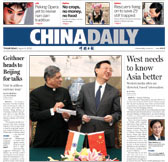

|
Mohsen Bilal
|
Everything in China arouses interest: geography, history, cultural heritage, and the "individual and collective" experience of the Chinese people as a whole. Since the Revolution and the Big March, China, as a state and a nation, fulfilled its destiny in the best possible way, dealing with its neighbors and the world in a manner that was exemplary. It has become a benchmark for other nations to measure their progress. China has achieved a great deal so far and looks forward to even greater progress, especially after it has emerged as an important member of the Group of 20 and will inevitably play a leading role in the world economy for decades to come.
China is well qualified to play such a role. Its national income has reached more than US$4 trillion, ranking at this writing as third in the world. The volume of its foreign trade has reached more than US$2.5 trillion. It is widely expected that according to the current economic growth rates, China will surpass the United States as the world's biggest economy by 2015. Recent studies suggest that China's local production rates will reach US$12 trillion, compared with US$11 trillion for the United States.
While maintaining its human essence, moral values and national identity, China has also tried to inspire the whole world by respecting the human dimension in progress thus creating a balance between the two, which can be easily observed when one visits this beautiful country.
By the new century, China introduced a new concept of creating a harmony between man and nature, man and society, city and countryside, social and economic development. According to the sixth National Conference of the Chinese Communist Party, held in 2002, the aim China sought to achieve was to build a society of comprehensive growth by 2020.
The pioneering Chinese experience over the last fifty years proves that individual creativity and collective discipline, along with firm administration and innovative thinking, are able to turn defects into virtues, wrong into right and mental conceptions into material facts. Indeed, China was able to turn deserts into agricultural land, erecting huge dams for generating electricity. It also built monumental industrial complexes, setting up fascinating activities, as the current exhibition shows.
Furthermore, China, which is seen today as one of the strongest developing nations in the world, has started to assume a leading international role in various fields. Statistics show that China currently ranks fourth in the world as the strongest industrial power, and in the field of agricultural production, it occupies the first three positions. In terms of energy resources, production and consumption, China is among the leading world countries.
It is, therefore, apt to express gratitude and respect for all the creative men and women who made such a progress possible. It is also an obligation for all of us to benefit from that experience, learn from it and work with it to elevate the welfare of mankind through economic growth and creative productivity.
We, in Syria, have been involved, for many years, in a national process of building a self-reliant national economy. We have had to overcome various challenges within the framework of manipulating, to a maximum degree, our potential and of opening up to world endeavors, building on the Chinese pioneering experience on that front. The Syrian efforts were able to achieve a qualitative progress by adopting the principle of self-reliance and by seeking self-sufficiency in other economic domains. This is, of course, a source of pride for Syria and the Syrian public in general.
On the occasion of Shanghai's hosting Expo 2010, we would like to express keen gratitude for the innovative organizers who sought to introduce their unique culture and put their material and social products in the service of man and world civilizations. It is gratitude commensurate with the huge achievements of Expo 2010 in terms of organization, the number of participating countries and companies and all the accompanying activities and initial preparatory work, ranging from large infrastructure down to the smallest details. We applaud the theme of "Better City, Better Life", and we expect this exposition to be an unqualified success. It deserves as much, considering all the creative skills and great effort behind it. Thus, we reiterate our utmost admiration for such an achievement.
We would also like to note the important role played by the city of Shanghai, not just on the level of developing the Chinese economy, but the international economy as well. This wonderful city has become an industrial base and one of the biggest Chinese harbors, carrying goods along with the spirit of cooperation all over the world.
As the world experiences different economic crises, it needs to invent new methods and adopts new approaches which can improve the living and economic standards of people, and allow for transcending the negative consequences which affect the lives of many counties and peoples, especially millions of poor all over the world. This necessarily requires taking into consideration the human and moral aspects of every economic and financial endeavor to ensure that solving the international economic crisis doesn't lead to creating new crises that could prove catastrophic to humanity.
I applaud the exuberant human experience and the creative standards set up by your friendly country. We want to stress our belief that creative societies and countries like yours will constitute the crux for a profound change toward a more stable, just and prosperous world.


